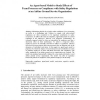Free Online Productivity Tools
i2Speak
i2Symbol
i2OCR
iTex2Img
iWeb2Print
iWeb2Shot
i2Type
iPdf2Split
iPdf2Merge
i2Bopomofo
i2Arabic
i2Style
i2Image
i2PDF
iLatex2Rtf
Sci2ools
425
click to vote
PRIMA
2015
Springer
2015
Springer
An Agent-Based Model to Study Effects of Team Processes on Compliance with Safety Regulations at an Airline Ground Service Organ
Maintaining high levels of safety under conditions of ever increasing air traffic is a challenging task. Failures to comply with safety-related regulations are often considered to be important contributors to safety occurrences. To address the issue of compliance, approaches based on external regulation of the employees’ behavior were proposed. Unfortunately, an externally imposed control is often not internalized by employees and has a short-term effect on their performance. To achieve a long-term effect, employees need to be internally motivated to adhere to regulations. Theories from social sciences propose that team processes play an important role in the dynamics of individual motivation. In this paper an agent-based model is proposed, by which the impact of social interaction and coordination in teams of platform employees on their individual motivation and compliance with safety regulations at an airline ground service organization are explored. The model was simulated and par...
| Added | 16 Apr 2016 |
| Updated | 16 Apr 2016 |
| Type | Journal |
| Year | 2015 |
| Where | PRIMA |
| Authors | Alexei Sharpanskykh, Rob Haest |
Comments (0)

